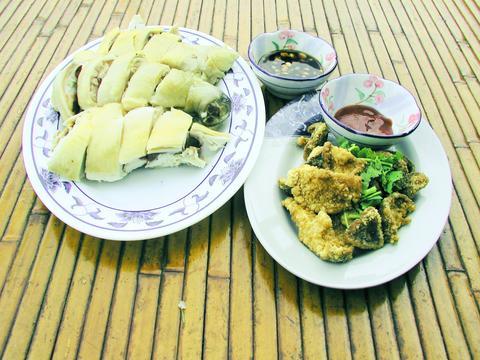For panoramic views of Taipei most people go to Yangmingshan, forgetting that at the southern end of the city are hills that provide some equally superb vistas and less crowds -- at least on most days. It's here at the end of a winding mountain road, above National Chengchi University, that the Monkey Mountain Chicken Farm enjoys a solitary perch with a truly spectacular view of the city.
The views alone would be enough to recommend this spot for a leisurely meal, but the unpretentious, country-style food makes a trip to this out-of-the-way spot just as worthwhile.
True to its name, the restaurant raises its own chickens. Some of these are kept in a coop at the farm's entrance, while others seem to have the freedom to wander about. Whatever their status, after a few years of gleefully pecking their way around the mountainside, they eventually make it to your plate as one of the restaurant's two specialty dishes: three cups chicken (三杯雞) or 100 dips chicken (百轉雞), the latter of which is chilled and ideal on warm summer days.

PHOTO: MAX WOODWORTH, TAIPEI TIMES
Be sure to try the deep-fried tofu, which is prepared to precisely the right texture and color. Another specialty dish at the farm is its breaded fried mushrooms, cooked to retain flavor without being overly greasy.
The farm grows most of its vegetables, but the best and most unusual is the so-called dragon whiskers (
The menu does, however, include most of the fry-up staples, such as beef and onion, and tomato and egg, but the star of the show is the chicken and it's what draws the locals back to this hidden spot.
Most diners choose to eat on the open terrace with the view of Taipei, but be sure to take a look at the extraordinary statues and relief carvings on display in the interior dining area. The intricacy of many of these pieces should warrant them being kept in a museum.
The restaurant is located adjacent to the Maokong tea farms that dot the hills above Mucha, but does not share the frequently clogged road to the tea houses. This is a blessing if you despise traffic in what should be a natural setting, but it can be a drawback if you travel by taxi, because cabbies either don't know the address or are afraid of ghosts that supposedly haunt the mountain.

In the March 9 edition of the Taipei Times a piece by Ninon Godefroy ran with the headine “The quiet, gentle rhythm of Taiwan.” It started with the line “Taiwan is a small, humble place. There is no Eiffel Tower, no pyramids — no singular attraction that draws the world’s attention.” I laughed out loud at that. This was out of no disrespect for the author or the piece, which made some interesting analogies and good points about how both Din Tai Fung’s and Taiwan Semiconductor Manufacturing Co’s (TSMC, 台積電) meticulous attention to detail and quality are not quite up to

April 21 to April 27 Hsieh Er’s (謝娥) political fortunes were rising fast after she got out of jail and joined the Chinese Nationalist Party (KMT) in December 1945. Not only did she hold key positions in various committees, she was elected the only woman on the Taipei City Council and headed to Nanjing in 1946 as the sole Taiwanese female representative to the National Constituent Assembly. With the support of first lady Soong May-ling (宋美齡), she started the Taipei Women’s Association and Taiwan Provincial Women’s Association, where she

Chinese Nationalist Party (KMT) Chairman Eric Chu (朱立倫) hatched a bold plan to charge forward and seize the initiative when he held a protest in front of the Taipei City Prosecutors’ Office. Though risky, because illegal, its success would help tackle at least six problems facing both himself and the KMT. What he did not see coming was Taipei Mayor Chiang Wan-an (將萬安) tripping him up out of the gate. In spite of Chu being the most consequential and successful KMT chairman since the early 2010s — arguably saving the party from financial ruin and restoring its electoral viability —

It is one of the more remarkable facts of Taiwan history that it was never occupied or claimed by any of the numerous kingdoms of southern China — Han or otherwise — that lay just across the water from it. None of their brilliant ministers ever discovered that Taiwan was a “core interest” of the state whose annexation was “inevitable.” As Paul Kua notes in an excellent monograph laying out how the Portuguese gave Taiwan the name “Formosa,” the first Europeans to express an interest in occupying Taiwan were the Spanish. Tonio Andrade in his seminal work, How Taiwan Became Chinese,